How Do You Keep an Oscar Fish Healthy for Maximum Lifespan?
This post may contain affiliate links.
Oscar fish (Astronotus ocellatus) are remarkable cichlids that can live 12-15 years with proper care, making them long-term companions for dedicated aquarists. These intelligent, charismatic fish require specific conditions and consistent care to reach their maximum lifespan potential. Understanding the comprehensive approach to Oscar fish health management is essential for anyone committed to providing these magnificent creatures with the best possible life in captivity.
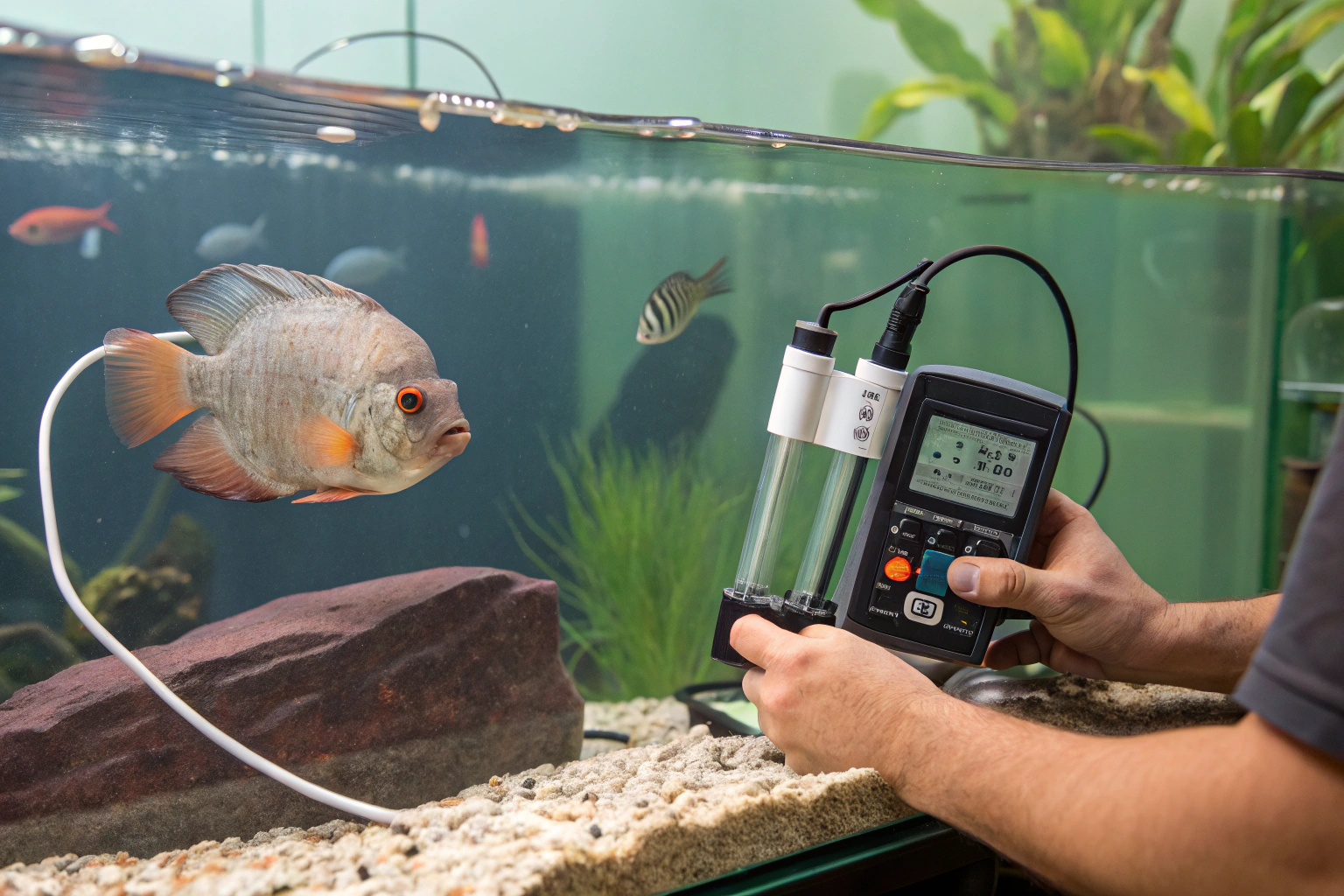
Creating the Optimal Tank Environment
Proper Tank Sizing for Longevity
The foundation of keeping an Oscar fish healthy for maximum lifespan begins with providing adequate space. Adult Oscars can reach 12-14 inches in length and require substantial swimming room to thrive. A single adult Oscar needs a minimum of 75 gallons, though 100+ gallons is ideal for optimal health and longevity.
For pairs or multiple Oscars, tank requirements increase significantly:
- Two Oscars: 150-200 gallons minimum
- Three or more Oscars: 250+ gallons recommended
- Community setups: Additional 50-75 gallons per compatible tank mate
Proper tank sizing prevents stunted growth, reduces territorial stress, and allows for better waste dilution – all critical factors in achieving maximum Oscar fish lifespan. The correlation between tank size and fish longevity is well-documented in large cichlid care research.
Essential Tank Setup Components
Creating a health-promoting environment requires careful attention to every aspect of the tank setup:
Substrate Selection: Choose either large gravel (too big to swallow) or bare bottom tanks. Fine gravel or sand can cause digestive blockages when ingested during feeding, potentially shortening lifespan.
Filtration System: Install robust filtration capable of handling 8-10 times the tank volume per hour. Oscars produce significant waste, making powerful filtration crucial for maintaining water quality and preventing disease.
Heating System: Use appropriately sized heaters (5 watts per gallon) with backup systems to maintain stable temperatures between 76-80°F (24-27°C). Temperature stability is crucial for immune system function and overall health.
Lighting: Provide 10-12 hours of moderate lighting daily to maintain natural circadian rhythms. LED systems with dimming capabilities allow for gradual day/night transitions that reduce stress.
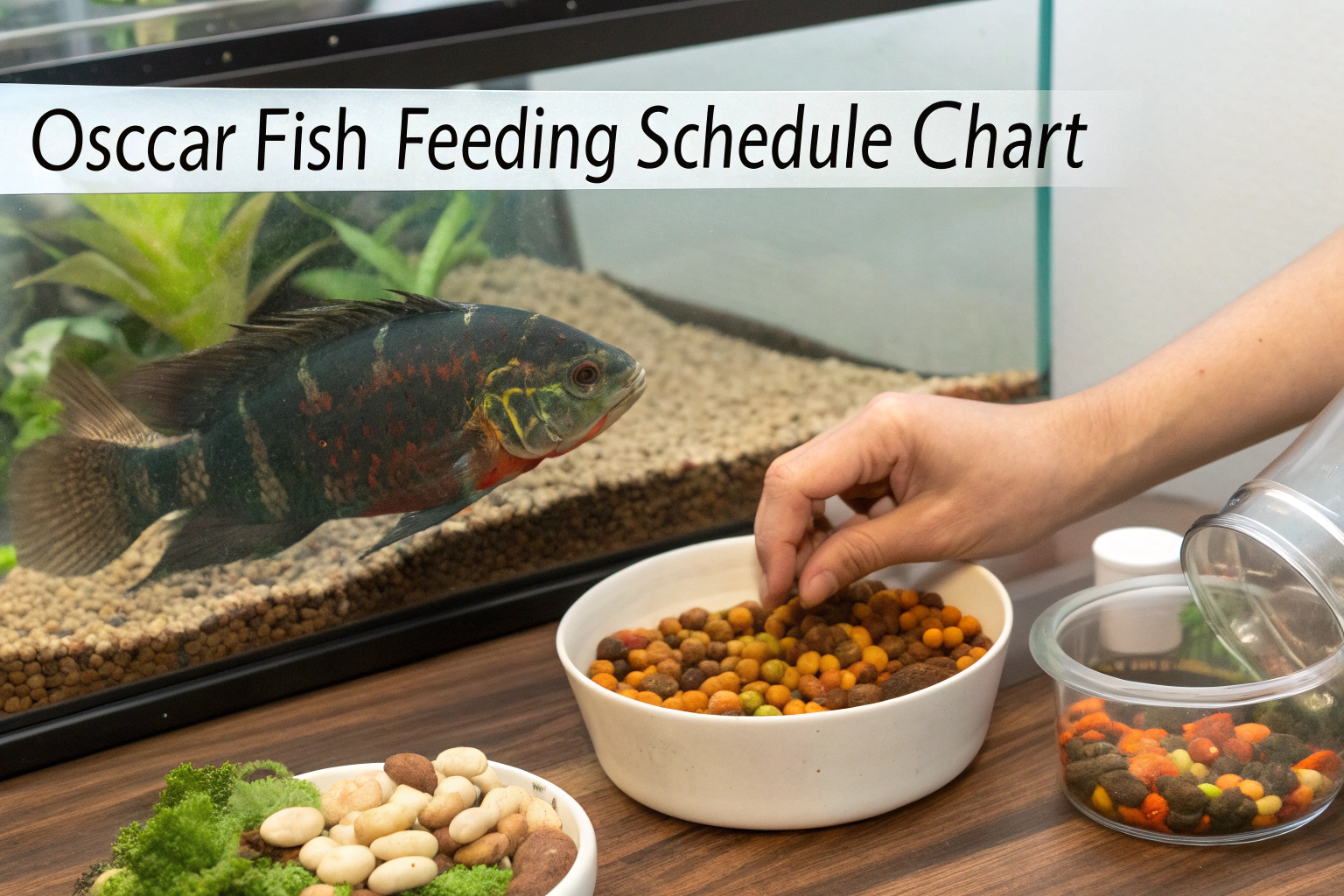
Water Quality Management for Maximum Health
Critical Water Parameters
Maintaining optimal water parameters is perhaps the most important factor in keeping Oscar fish healthy for maximum lifespan. These parameters must be monitored and maintained consistently:
Temperature: 76-80°F (24-27°C) – stable temperatures support immune function pH: 6.5-7.5 – slightly acidic to neutral water promotes optimal health Ammonia: 0 ppm – any detectable ammonia is toxic and life-threatening Nitrite: 0 ppm – nitrites interfere with oxygen transport in fish blood Nitrate: Below 20 ppm – elevated nitrates cause chronic stress and immune suppression Hardness: 5-20 dGH – moderate hardness supports osmoregulation
Regular testing with reliable test kits ensures early detection of parameter drift before it affects fish health. Digital meters provide more accurate readings than test strips for critical parameters like pH and temperature.
Water Change Protocols
Consistent water changes are fundamental to Oscar fish longevity. Due to their large size and high bioload, Oscars require more frequent water changes than smaller fish species:
Weekly Maintenance: Remove 25-30% of tank water weekly, vacuum substrate, and clean filter media as needed.
Bi-weekly Deep Cleaning: Perform 40-50% water changes every two weeks, including thorough gravel vacuuming and decoration cleaning.
Emergency Protocols: During illness or stress periods, daily 10-15% water changes help maintain optimal conditions for recovery.
Always match new water temperature to tank temperature and use appropriate water conditioners to neutralize chlorine and chloramines. Consider implementing professional aquarium maintenance schedules for consistent care routines.
Optimal Nutrition for Longevity
Balanced Diet Foundation
Proper nutrition is crucial for keeping Oscar fish healthy throughout their maximum lifespan. A varied, high-quality diet supports immune function, promotes proper growth, and prevents nutrition-related diseases that can shorten life expectancy.
High-Quality Pellets: Choose pellets specifically formulated for large cichlids with at least 35-40% protein content. Pellets should be appropriately sized for adult Oscars (6-8mm diameter) to prevent choking or digestive issues.
Frozen Foods: Incorporate variety with frozen bloodworms, brine shrimp, krill, and silversides. These foods provide essential nutrients and stimulate natural hunting behaviors.
Live Foods: Occasional live foods like earthworms, crickets, or feeder fish can provide enrichment, but should be quarantined and treated to prevent disease transmission.
Fresh Foods: Supplement with blanched vegetables like peas, spinach, and zucchini to provide fiber and plant-based nutrients.
Feeding Protocols for Health
Proper feeding schedules and portion control significantly impact Oscar fish health and lifespan:
Feeding Frequency: Feed adult Oscars 2-3 times daily, offering only what they can consume in 2-3 minutes per feeding session.
Portion Control: Overfeeding is a common cause of shortened lifespan. Monitor body condition and adjust portions accordingly – healthy Oscars should have a slight taper from head to tail.
Fasting Days: Implement 1-2 fasting days per week to promote digestive health and prevent obesity-related complications.
Feeding Variety: Rotate different food types weekly to ensure complete nutrition and prevent dietary deficiencies.
Seasonal Adjustments: Reduce feeding frequency during cooler months when metabolism naturally slows, mimicking natural seasonal patterns.
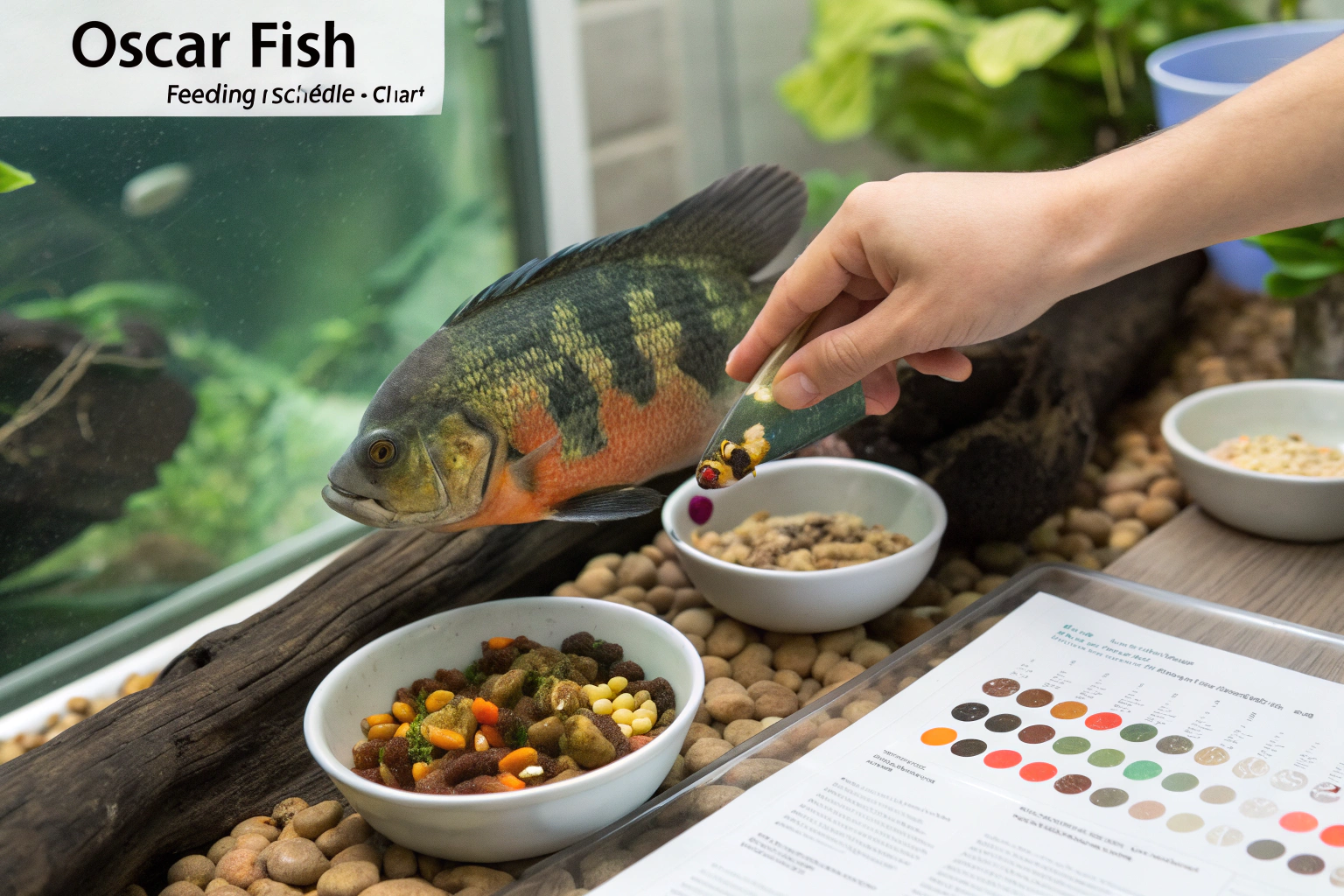
Disease Prevention and Health Monitoring
Proactive Health Management
Preventing disease is far more effective than treating established illnesses. A comprehensive health management approach includes:
Daily Observation: Spend 5-10 minutes daily observing your Oscar’s behavior, appetite, and physical appearance. Early detection of problems allows for prompt intervention.
Weekly Health Checks: Conduct thorough visual inspections for signs of disease, injury, or behavioral changes. Document any observations to track patterns over time.
Quarantine Protocols: Always quarantine new fish for 6-8 weeks before introduction to the main tank. This prevents disease introduction and allows observation of new fish health.
Stress Reduction: Minimize stress through consistent routines, appropriate tank mates, and stable environmental conditions. Chronic stress suppresses immune function and increases disease susceptibility.
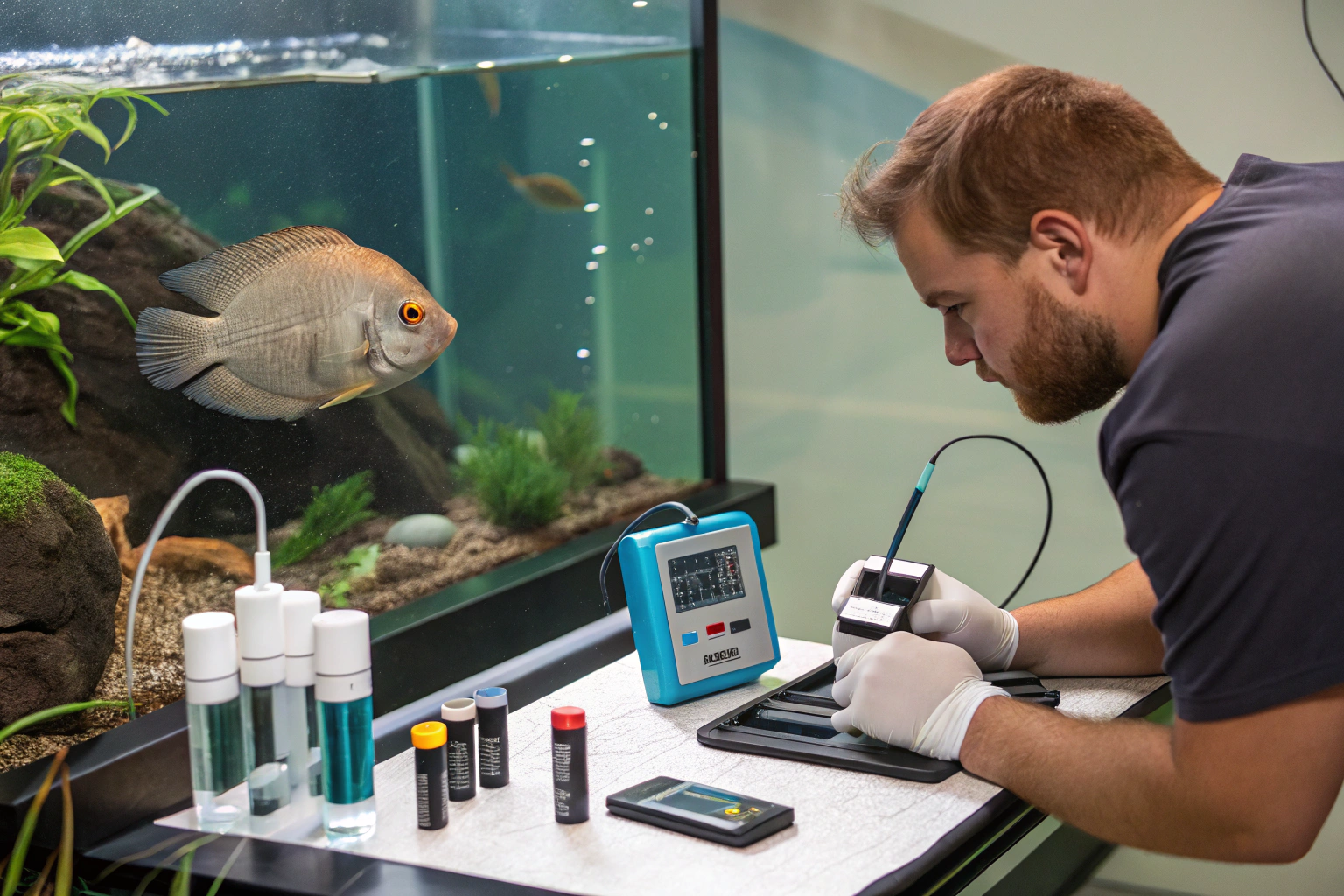
Common Health Issues and Prevention
Understanding common Oscar fish health problems enables better prevention strategies:
Hole-in-the-Head Disease (HITH): Often caused by poor water quality, nutritional deficiencies, or stress. Prevention involves maintaining pristine water conditions and providing balanced nutrition.
Ich (White Spot Disease): Parasitic infection triggered by stress or temperature fluctuations. Maintain stable conditions and quarantine new additions to prevent outbreaks.
Fin Rot: Bacterial infection usually resulting from poor water quality or physical injury. Regular water changes and careful tank maintenance prevent most cases.
Swim Bladder Disorders: Often caused by overfeeding, poor diet, or genetic factors. Proper feeding protocols and high-quality nutrition reduce risk.
Internal Parasites: Can be introduced through live foods or new fish. Quarantine procedures and periodic fecal examinations help detect and prevent infestations.
Establishing relationships with qualified aquatic veterinarians ensures access to professional care when needed. Consider consulting specialized fish health resources for complex health issues.
Environmental Enrichment for Mental Health
Creating Stimulating Environments
Mental stimulation is crucial for keeping Oscar fish healthy throughout their maximum lifespan. These intelligent fish require environmental enrichment to prevent boredom and associated stress-related health problems.
Territorial Structures: Provide caves, overhangs, and hiding spots using aquarium-safe rocks, driftwood, or artificial decorations. Oscars appreciate secure territories and retreat areas.
Rearrangement Opportunities: Allow Oscars to move lightweight decorations and dig in substrate. This natural behavior provides mental stimulation and exercise.
Interactive Feeding: Use feeding rings, puzzle feeders, or hide food in different locations to encourage natural foraging behaviors and mental engagement.
Visual Barriers: Create sight breaks with tall plants or decorations to reduce constant visual contact between tank mates, reducing territorial stress.
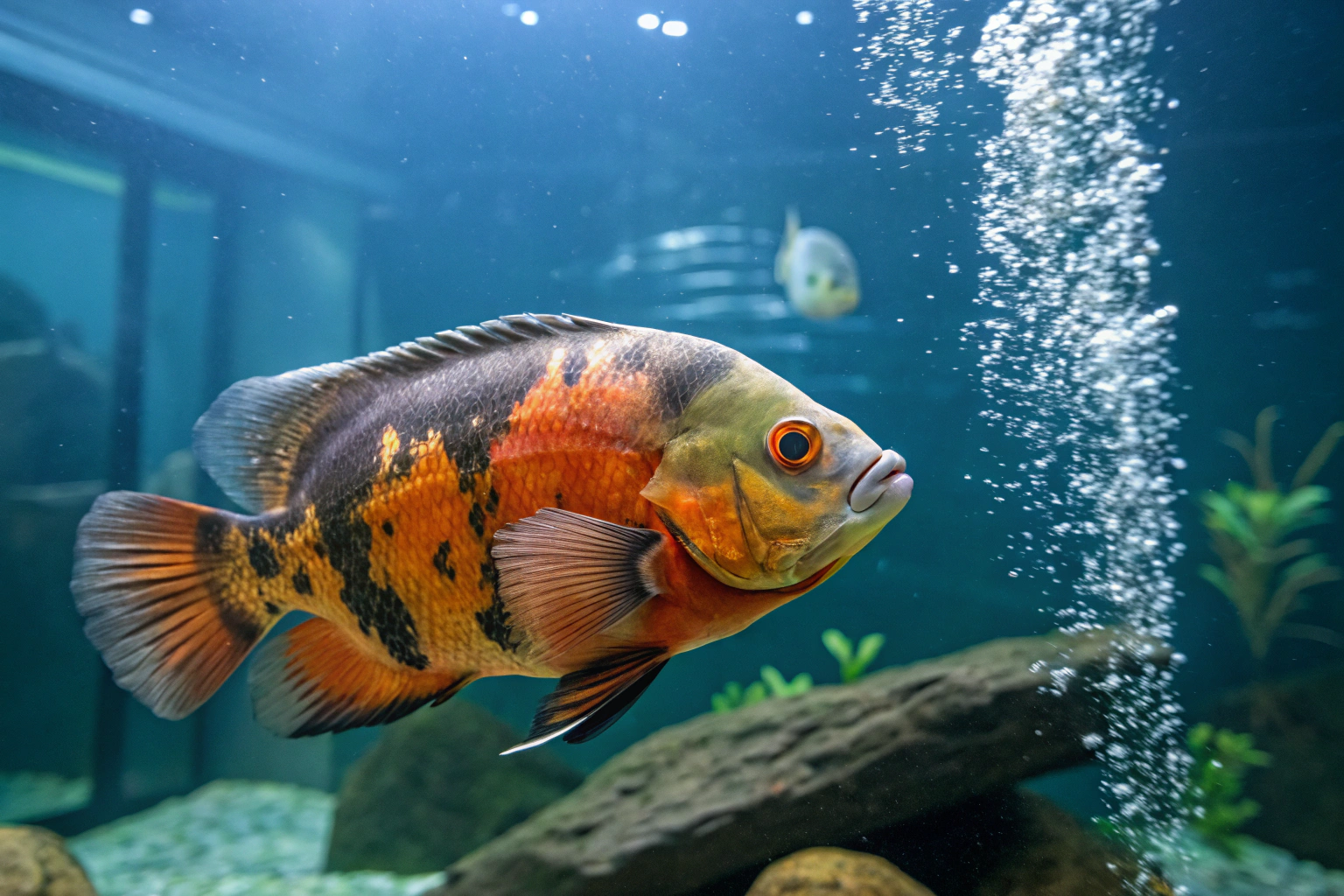
Social Considerations
Proper social environment significantly impacts Oscar fish health and longevity:
Compatible Tank Mates: Choose fish that can coexist peacefully with Oscars – similar-sized, non-aggressive species that share water parameter requirements.
Appropriate Stocking Density: Avoid overcrowding, which increases stress, aggression, and disease transmission. Maintain territories large enough for each fish to establish comfort zones.
Pair Dynamics: Bonded Oscar pairs often live longer than solitary fish, but incompatible pairs can experience chronic stress. Monitor pair interactions carefully.
Advanced Health Optimization Strategies
Seasonal Care Adjustments
Adapting care routines to seasonal changes can enhance Oscar fish health and longevity:
Temperature Management: Slight seasonal temperature variations (2-3°F) can stimulate natural behaviors and breeding readiness in healthy fish.
Feeding Adjustments: Increase feeding frequency during warmer months when metabolism is higher, reduce during cooler periods.
Water Change Scheduling: Increase water change frequency during summer months when biological activity is higher.
Lighting Cycles: Adjust photoperiods seasonally to match natural daylight patterns, supporting circadian rhythm health.
Preventive Health Treatments
Certain preventive treatments can support long-term Oscar fish health:
Vitamin Supplementation: Periodic vitamin supplements, especially vitamin C and E, support immune function and stress resistance.
Probiotic Treatments: Beneficial bacteria supplements help maintain healthy gut flora and improve disease resistance.
Salt Baths: Occasional salt baths (using aquarium salt, not table salt) can help prevent external parasites and support osmoregulation.
UV Sterilization: UV sterilizers can reduce pathogen loads in tank water, supporting overall health maintenance.
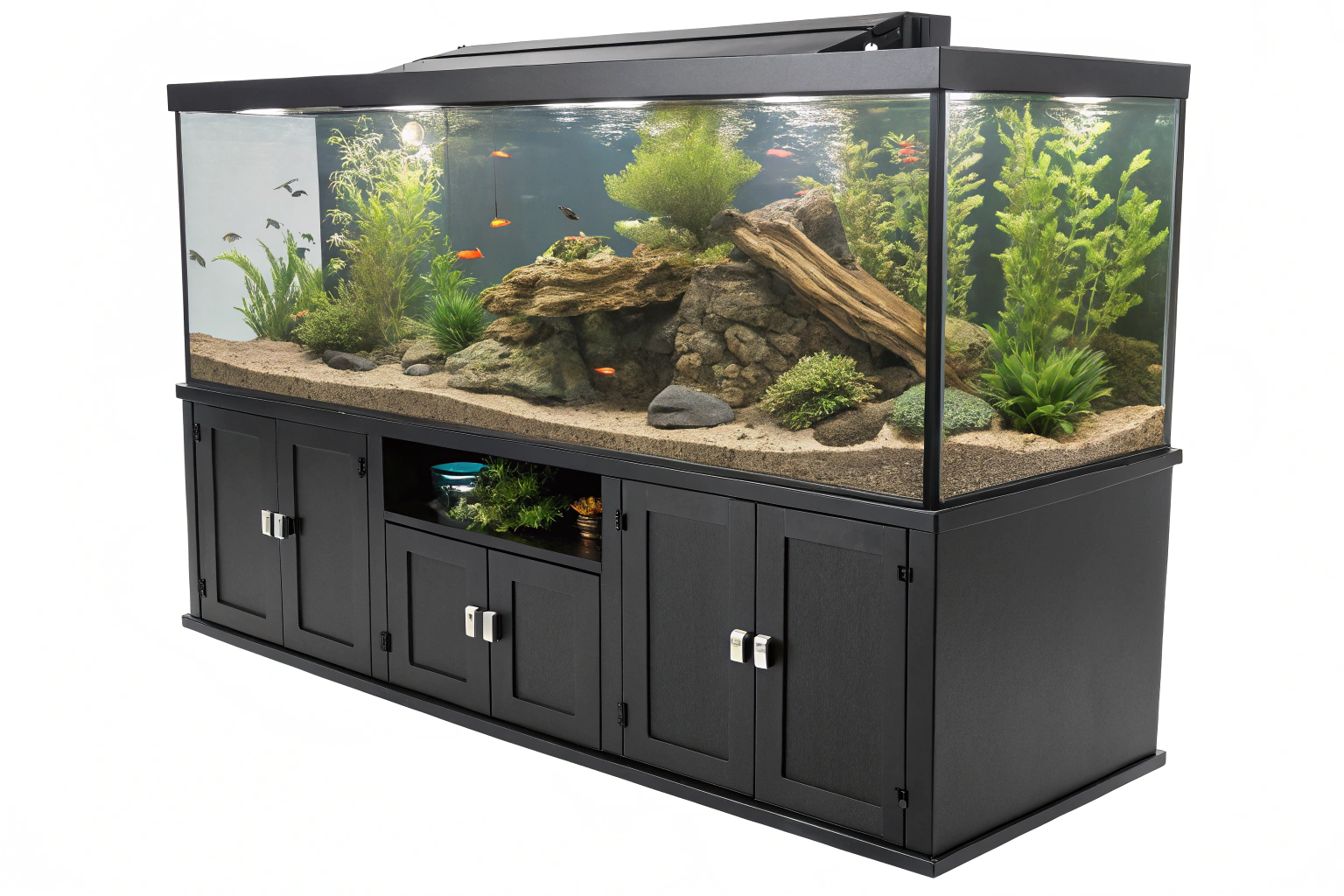
Breeding and Reproduction Health
Healthy Breeding Practices
For aquarists interested in breeding, maintaining breeding fish health is crucial for maximum lifespan:
Pre-breeding Conditioning: Ensure breeding pairs are in optimal health before attempting reproduction. Poor health during breeding can significantly shorten lifespan.
Breeding Tank Setup: Provide separate breeding facilities with optimal conditions to reduce stress on breeding pairs.
Post-breeding Recovery: Allow adequate recovery time between breeding attempts to prevent exhaustion and health decline.
Genetic Considerations: Avoid inbreeding, which can reduce overall health and lifespan in offspring.
Technology and Monitoring Systems
Modern Health Monitoring Tools
Advanced monitoring systems can help maintain optimal conditions for maximum Oscar fish lifespan:
Automated Testing Systems: Digital monitoring systems provide continuous parameter tracking and alerts for dangerous changes.
Smart Heaters and Controllers: Programmable heating systems maintain precise temperatures and prevent dangerous fluctuations.
Automated Feeding Systems: Programmable feeders ensure consistent feeding schedules even when owners are away.
Water Quality Meters: Digital pH, TDS, and temperature meters provide accurate, real-time water quality data.
Backup Systems: Automated backup systems prevent equipment failures that could threaten fish health.
Consider implementing modern aquarium monitoring technology for comprehensive health management.
Emergency Preparedness and Response
Emergency Planning for Health Crises
Preparing for health emergencies ensures rapid response when Oscar fish health is threatened:
Hospital Tank Setup: Maintain a separate hospital tank ready for immediate use during health crises.
Emergency Medication Supply: Stock essential medications for common Oscar fish health problems.
Emergency Contact List: Maintain contact information for aquatic veterinarians and experienced hobbyists.
Backup Equipment: Keep backup heaters, filters, and air pumps ready for equipment failures.
Emergency Protocols: Develop step-by-step response plans for common emergency scenarios.
First Aid and Basic Treatment
Understanding basic first aid can save Oscar fish lives during health emergencies:
Wound Treatment: Clean, shallow wounds with aquarium salt solutions and monitor for infection.
Stress Reduction: Dim lights, reduce feeding, and maintain pristine water quality during illness.
Quarantine Procedures: Isolate sick fish immediately to prevent disease spread and allow focused treatment.
Medication Administration: Follow dosing instructions precisely and complete full treatment courses.
Recovery Monitoring: Document treatment responses and adjust protocols as needed.
Long-term Health Tracking
Health Record Maintenance
Maintaining detailed health records supports long-term Oscar fish health management:
Daily Observations: Record feeding response, behavior, and any unusual observations.
Weekly Measurements: Track weight, length, and body condition scores over time.
Monthly Assessments: Conduct comprehensive health evaluations and photo documentation.
Annual Reviews: Assess overall health trends and adjust care protocols accordingly.
Veterinary Records: Maintain records of all veterinary consultations and treatments.
Aging and Senior Care
As Oscar fish age, care requirements may change to support continued health:
Dietary Adjustments: Older fish may require softer foods and adjusted feeding schedules.
Environmental Modifications: Reduce water flow and provide additional resting areas for senior fish.
Increased Monitoring: Senior fish require more frequent health assessments and water quality checks.
Comfort Measures: Focus on comfort and quality of life rather than aggressive treatments in very old fish.
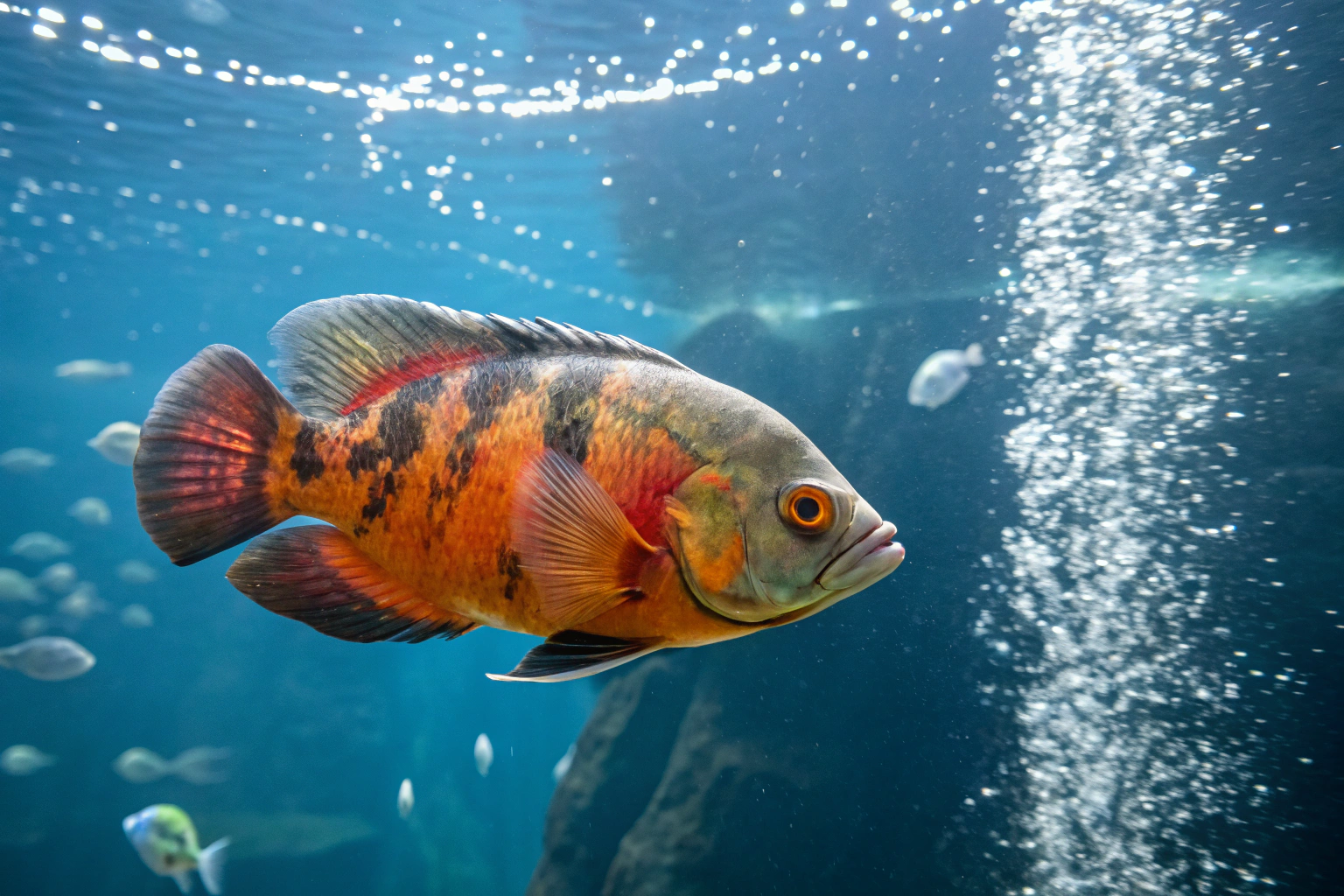
Conclusion
Keeping Oscar fish healthy for maximum lifespan requires dedication, knowledge, and consistent attention to detail. The key factors include providing adequate space, maintaining excellent water quality, offering proper nutrition, preventing disease, and creating an enriching environment. By implementing comprehensive care protocols and staying vigilant about health monitoring, aquarists can help their Oscar fish achieve their full lifespan potential of 12-15 years or more.
Success in Oscar fish keeping comes from understanding that these intelligent creatures require more than basic care – they need comprehensive health management that addresses their physical, mental, and social needs. Every aspect of their environment, from tank size to water quality to social interactions, contributes to their overall health and longevity.
The investment in proper Oscar fish care pays dividends in the form of healthy, vibrant fish that display their full personality and beauty throughout their lives. By following evidence-based care protocols and maintaining high standards of aquarium management, aquarists can provide their Oscar fish with the best possible chance for a long, healthy, and fulfilling life.
Remember that each Oscar fish is an individual with unique needs and characteristics. Successful long-term care requires adapting general guidelines to your specific fish’s requirements while maintaining the fundamental principles of excellent husbandry. With proper care, your Oscar fish can be a rewarding companion for well over a decade, bringing joy and fascination to your aquarium hobby for years to come.
